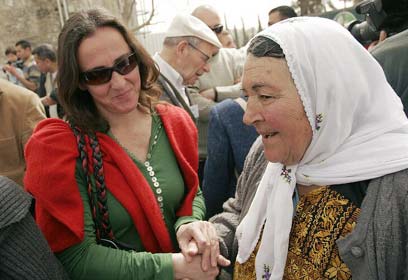
A weekend of grief, discussion, and optimism
In 1994, Hamas murdered 19 year-old Arik Frankenthal. In response to this tragedy, his father, Yitzhak Frankenthal, decided to establish the Israeli-Palestinian Bereaved Families Forum. This past weekend 90 of its members gathered for a unique conference in East Jerusalem
“The death of a loved one is a point of no return, yet we specifically decided to act from this place, in order to prevent future bereavement, and so that our group will not get any bigger.” This is how the members of the Israeli-Palestinian Bereaved Families Forum described the purpose of their conference.
This past weekend, 90 of them gathered in the St George Hotel in East Jerusalem where they took part in a conference entitled “Knowing is the Beginning." The conference, part of a larger project that has been going on for the past six months, seeks to reveal the identity of the people behind the names, and in this framework, the members participated in discussions, lectures, and emotional personal meetings.
In July 1994, 19-year-old Arik Frankenthal was kidnapped and murdered by Hamas activists. In response to this tragedy, his father, Yitzhak Frankenthal, decided to establish a parents' group, which became the forum for bereaved parents who lost loved ones in the conflict. Today there are hundreds of Israeli and Palestinian members in the forum, who meet regularly and organize many activities.
“In order to put an end to the conflict through mutual dialogue, it was natural that the forum would expand and include not just Israelis, but also Palestinians who lost family members to the conflict,” they explained.
The organizers of the conference, which was funded by the Japanese government, said that they decided to hold the conference in East Jerusalem so that members from both sides could participate. During the conference, members of the forum shared personal experiences of the past, future plans, and also emotional personal meetings.
One meeting, which stood out, took place in Hebron between Boaz Kitain and Osama Abu Ayash. Boaz lost his son in the 1997 helicopter tragedy, and the roots of his personal story start at the beginning of the century in Hebron, where his grandfather lived. During the pogroms of 1929, Palestinian friends saved the lives of members of his family. Osama’s story also begins with the story of his grandfather, who was injured and then killed in the battle in Gush Etzion. Osama’s wife lost two of her brothers.
Another powerful meeting took place between Mashka Litvack and Id Abu Ayash. Mashka lost her father in 1948, before she was born, and she was named after him. In November 1970, her older brother, Arnon, was killed when he was 26. Over a decade later, in 1983, Mashka herself was injured in the head and legs from shrapnel from a grenade, while she was participating in the “Peace Now” demonstration where Emil Greenzweig was killed. Id also lost his father in 1948, when he was six months old, in the battle for Kfar Etzion.
Another meeting took place between Nasra Shihab, who lost two sons in different incidents with the IDF, and Kamal Zidan, a handicapped IDF veteran who was injured during the Yom Kippur War, and who lost two sons during their army service.

'I do not have the privilege of losing hope'
An unusual guest at the conference was Anne Carr, a Northern Ireland peace activist, who wanted to share her experiences from her homeland with the members of the forum.
At the end of the second day, Carr emotionally said “this was a first rate learning experience for me and an even greater experience than I imagined.” According to her, “it is amazing that people from both sides of the barricade who experienced bereavement and pain are able to share their experiences and their pain. The fact that the forum is successful in creating such dialogue is amazing, and I have no doubt that despite the pain, such a project will make a difference.”
Carr explained that “it will take time,” but added “things will change. I have no doubt that I will use the experiences of the past two days in my work in Northern Ireland.”
At the end of the conference, Roni Hirshenzon, one of the founders of the forum, wanted to express optimism: “I believe with all my heart in change”, he explained, and then added, “I do not have the privilege of losing hope. I have children and grandchildren.”
According to Hirshenzon, “if we want to live here, we have to work for change. I have no doubt that we are talking about a long process, but the fact that those who paid the heaviest price, the price of bereavement, from both sides, are the ones capable of sitting and talking about the great pain and the occupation from both sides of the divide, shows that it is possible to come to a solution and co-existence. After these two days it is clear to me that we have reached a high level in the relationship between the Palestinian and Israeli participants.”










